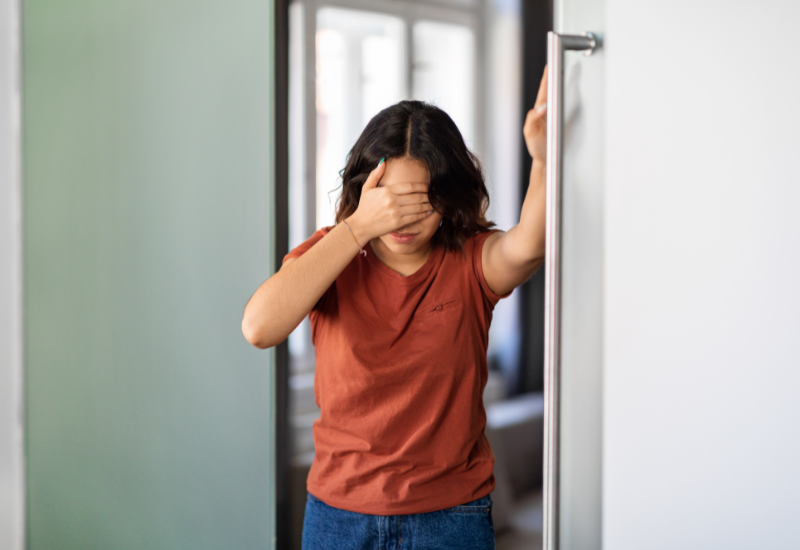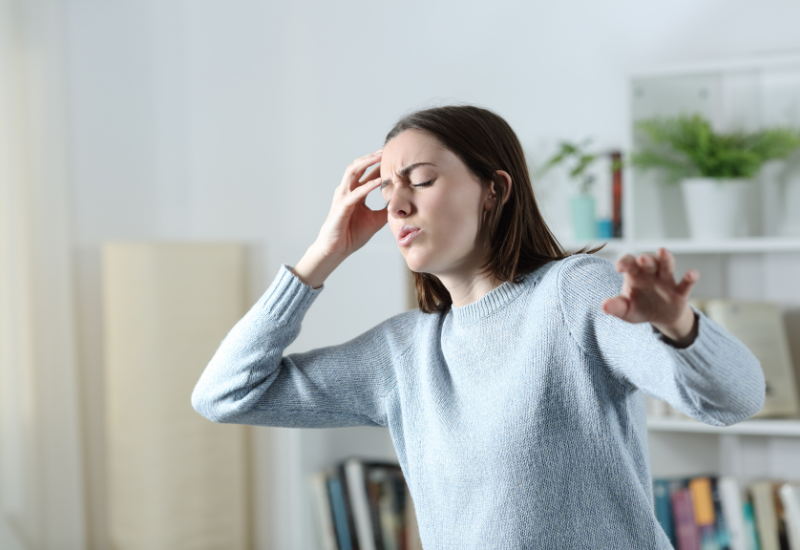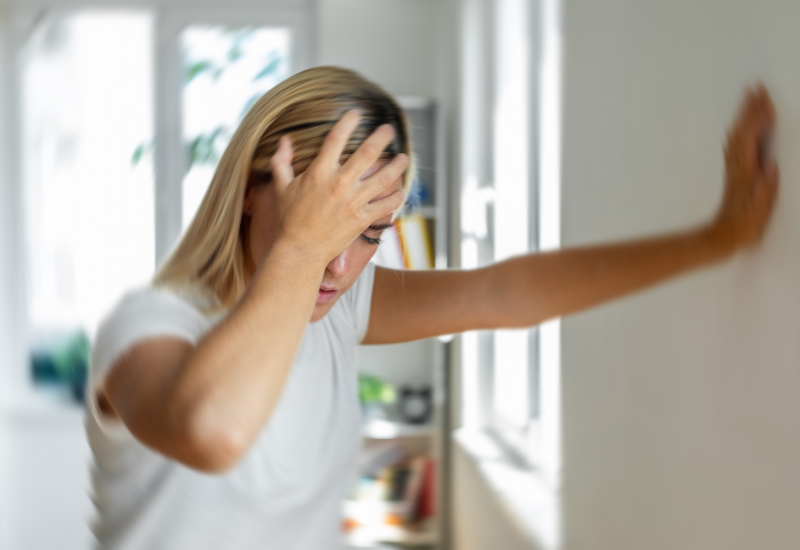Vertigo

Our Services
Let's Get In Touch

Vertigo
Vertigo is a specific type of dizziness characterized by a false sense of spinning or movement, often triggered by changes in position or movement of the head. It’s typically associated with issues in the inner ear or central nervous system.
Common symptoms of vertigo include:
- A spinning sensation
- Balance problems
- Nausea or vomiting
- Sweating
- Ringing in the ears (tinnitus)
- Visual disturbances
People often confuse vertigo with other types of dizziness, such as:
- Lightheadedness: A feeling of faintness or feeling like you might pass out.
- Disequilibrium: A sensation of unsteadiness or imbalance, often related to a lack of coordination.
- Dizziness: A general term that can encompass various sensations, including feeling faint or unsteady.
Vertigo can arise from various causes, primarily related to issues in the vestibular system, which is responsible for balance. Here are some common causes and the associated organ systems:
1. Inner Ear Disorders
- Benign Paroxysmal Positional Vertigo (BPPV): Small crystals in the inner ear become dislodged, causing brief episodes of vertigo with head movements.
- Meniere’s Disease: Characterized by episodes of vertigo, hearing loss, tinnitus, and a feeling of fullness in the ear due to fluid buildup.
- Vestibular Neuritis: Inflammation of the vestibular nerve, often due to viral infections, causing sudden vertigo.
2. Central Nervous System Disorders
- Migraine-Associated Vertigo: Vestibular migraines can lead to episodes of vertigo, often accompanied by headache.
- Stroke or Transient Ischemic Attack (TIA): Impairment of blood flow to parts of the brain can cause sudden vertigo, especially if the brainstem is affected.
- Multiple Sclerosis: Can affect the vestibular pathways in the brain, leading to vertigo.
3. Cardiac Causes
- Arrhythmias:
- Irregular heartbeats can lead to reduced blood flow to the brain, causing dizziness and vertigo.
- Hypotension (Low Blood Pressure):
- A sudden drop in blood pressure, particularly upon standing (orthostatic hypotension), can cause lightheadedness and vertigo.
- Cardiac Ischemia:
- Reduced blood flow to the heart can impact overall circulation, leading to symptoms like vertigo, especially during exertion.
- Heart Failure:
- Inadequate pumping ability of the heart can result in insufficient blood supply to the brain, leading to dizziness and vertigo.
4. Neck Vessel Causes
- Vertebrobasilar Insufficiency:
- Reduced blood flow to the brainstem and cerebellum through the vertebral and basilar arteries can cause vertigo, often related to head movements or neck positioning.
- Carotid Artery Disease:
- Narrowing or blockage of the carotid arteries can limit blood flow to the brain, leading to symptoms of dizziness or vertigo.
- Cervical Artery Dissection:
- A tear in the lining of a cervical artery can lead to reduced blood flow to the brain, resulting in vertigo and other neurological symptoms.
5 . Other Causes
- Head Trauma: Concussions or other injuries can affect the inner ear or brain areas responsible for balance.
- Medications: Certain medications, particularly ototoxic drugs (like some antibiotics), can lead to vertigo.
- Anxiety Disorders: Anxiety can sometimes cause sensations of dizziness and unsteadiness that are mistaken for vertigo.
Vertigo can be triggered by various factors, depending on the underlying cause. Here are some common triggers:
1. Positional Changes
- Sudden movements of the head, such as bending over, looking up, or rolling over in bed, can trigger episodes, especially in conditions like Benign Paroxysmal Positional Vertigo (BPPV).
2. Changes in Head Position
- Tilting or turning the head quickly can provoke vertigo in individuals with vestibular disorders.
3. Physical Activity
- Strenuous exercise or rapid head movements can lead to vertigo, particularly in those with inner ear issues.
4. Visual Stimuli
- Fast-moving visuals or busy patterns can trigger vertigo in individuals with vestibular migraines.
5. Stress and Anxiety
- High stress or anxiety levels can exacerbate feelings of dizziness or vertigo.
6. Loud Noises
- Exposure to loud sounds can trigger vertigo in some people, especially those with Meniere’s disease.
7. Fluid Changes
- Changes in body fluid levels (e.g., dehydration) can lead to vertigo, particularly in individuals with Meniere’s disease.
8. Medication Side Effects
- Certain medications, especially ototoxic ones, can trigger vertigo as a side effect.
9. Alcohol and Caffeine
- Excessive consumption of alcohol or caffeine can exacerbate vestibular issues and lead to vertigo.
10. Illnesses and Infections
- Viral infections (like vestibular neuritis) or sinus infections can trigger vertigo by affecting the inner ear or balance pathways.
Managing vertigo often involves a combination of treatments and lifestyle adjustments, depending on the underlying cause. Here are some strategies that can help alleviate vertigo symptoms:
1. Vestibular Rehabilitation Therapy (VRT)
- A specialized form of physical therapy designed to improve balance and reduce dizziness through exercises that promote vestibular adaptation.
2. Epley Maneuver
- A specific set of head and body movements used to treat Benign Paroxysmal Positional Vertigo (BPPV) by repositioning displaced crystals in the inner ear.
3. Medications
- As prescribed by a doctor
4. Hydration and Diet
- Staying well-hydrated and managing salt intake can help with conditions like Meniere’s disease, where fluid balance is crucial.
- Avoiding caffeine and alcohol may also reduce symptoms.
5. Managing Triggers
- Identifying and avoiding specific triggers (like certain head movements, visual stimuli, or stress) can help reduce the frequency of vertigo episodes.
6. Home Safety Modifications
- Making changes to the home environment (e.g., removing tripping hazards, using non-slip mats) can help prevent falls during episodes.
7. Stress Management Techniques
- Practicing relaxation techniques such as yoga, meditation, or deep breathing can help reduce stress-related vertigo.
8. Rest and Positioning
- Lying down in a quiet, dark room during severe episodes can help alleviate symptoms until they pass.
9. Consulting a Specialist
- For persistent or severe vertigo, seeing a neurologist may be necessary for further evaluation and treatment.
FOR MORE INFORMATION, READ OUR BLOGS
FAQ's
Vertigo is a sensation of spinning or movement, often described as feeling like you or your surroundings are moving when they are not.
Common causes include inner ear disorders (like BPPV and Meniere’s disease), vestibular neuritis, migraines, and central nervous system conditions.
Symptoms include a spinning sensation, balance problems, nausea, vomiting, sweating, and sometimes ringing in the ears.
Diagnosis typically involves a physical examination, patient history, and possibly tests like balance assessments, hearing tests, or imaging studies.
Yes, treatment depends on the underlying cause and may include medications, physical therapy (like vestibular rehabilitation), or maneuvers (like the Epley maneuver for BPPV).
Common causes include inner ear disorders (like BPPV and Meniere’s disease), vestibular neuritis, migraines, and central nervous system conditions.
Yes, stress and anxiety can exacerbate dizziness and vertigo symptoms, particularly in individuals prone to vestibular issues.
Staying hydrated, avoiding caffeine and alcohol, managing stress, and engaging in balance exercises can help reduce symptoms.
Vertigo itself is often not serious, but it can be a symptom of an underlying condition that may require medical attention.
Yes, children can experience vertigo, though it may be less common. Causes can include inner ear infections or migraines.
If you experience vertigo while driving, safely pull over and stop until the symptoms pass. Avoid driving until you feel completely stable.
The duration of vertigo episodes varies widely. Some episodes last seconds (like BPPV), while others can persist for hours or even days (as with Meniere’s disease).
Yes, certain medications can alleviate symptoms, such as antihistamines for motion sickness or anti-nausea medications.
Seek medical attention immediately. Not only is it a bothersome symptom, vertigo can be persistent, severe, accompanied by other concerning symptoms (like headache, vision changes, or difficulty speaking), or significantly impacts daily life. And it may be caused by potentially life threatening conditions.

